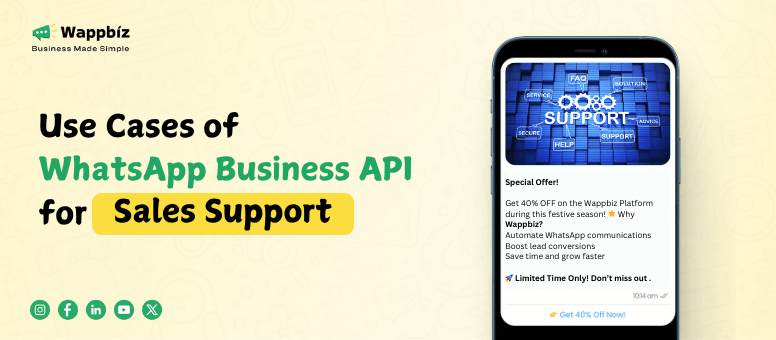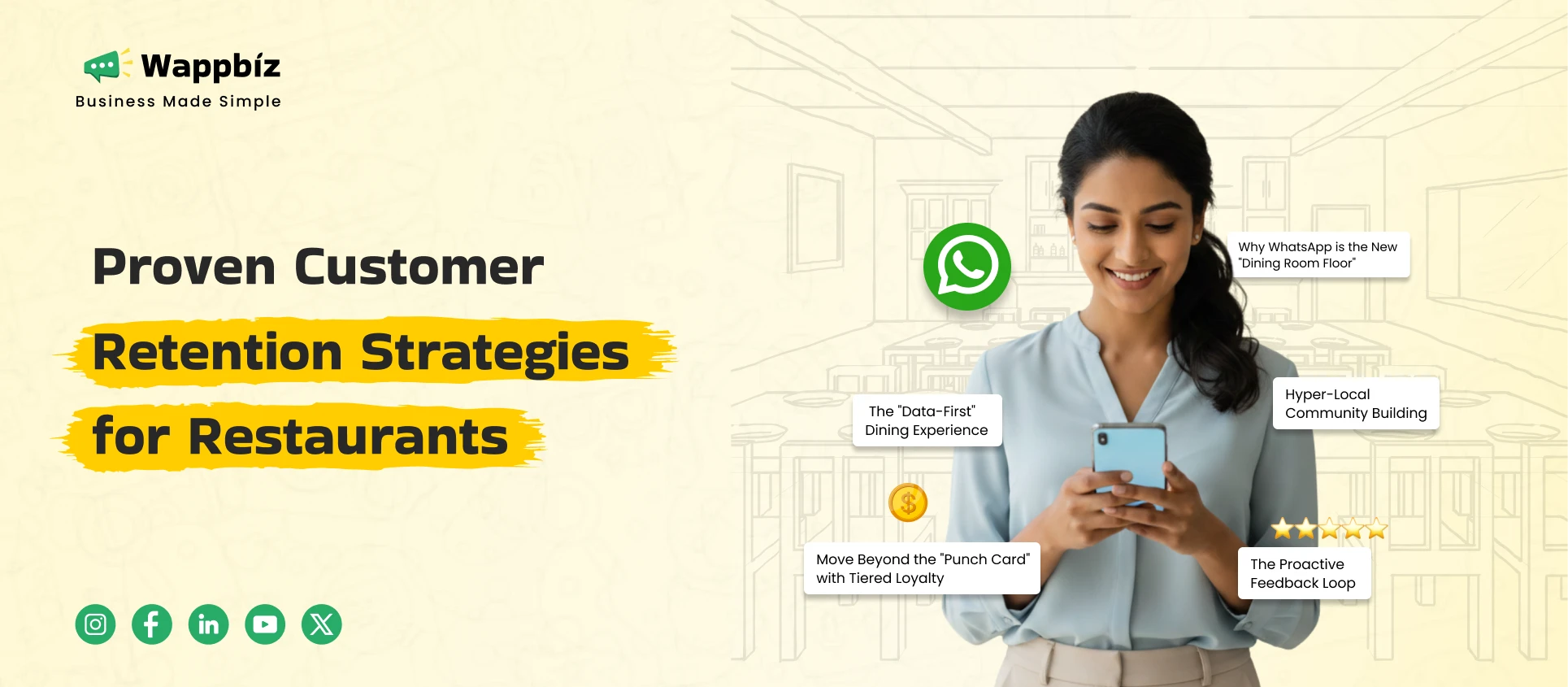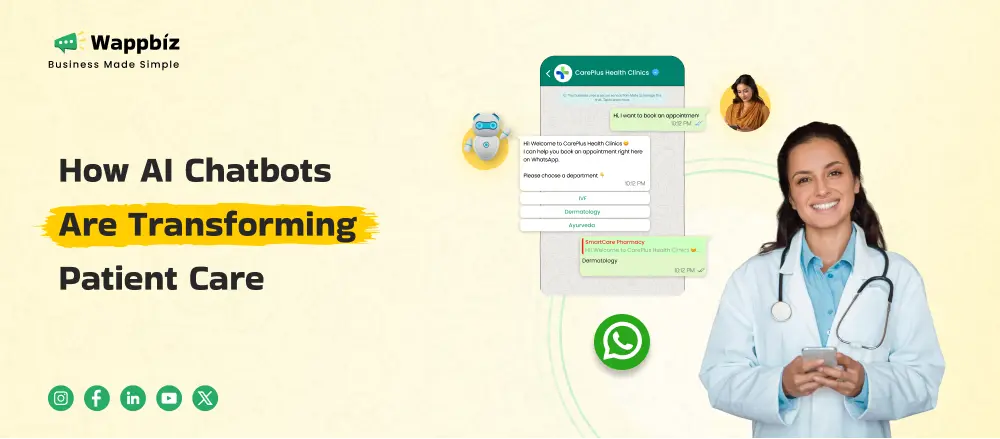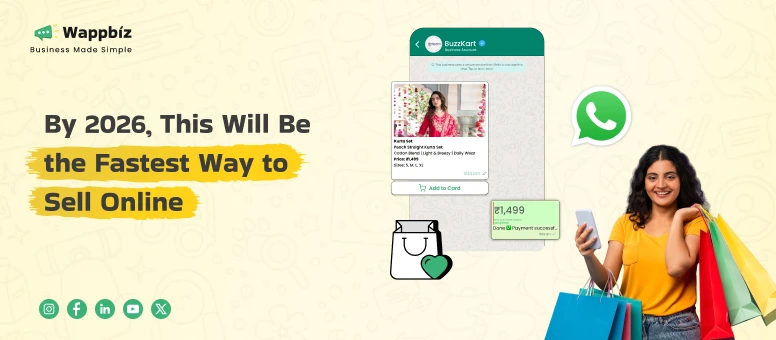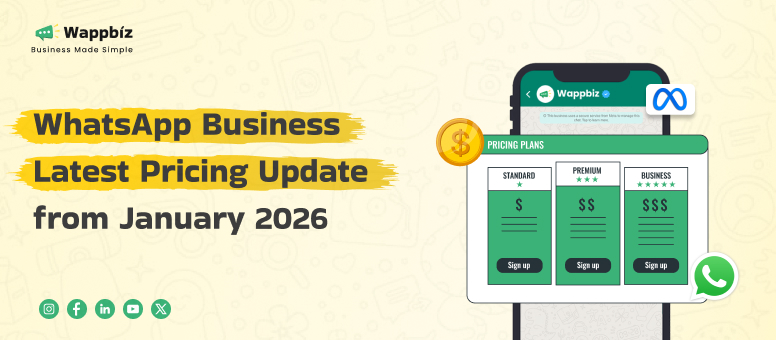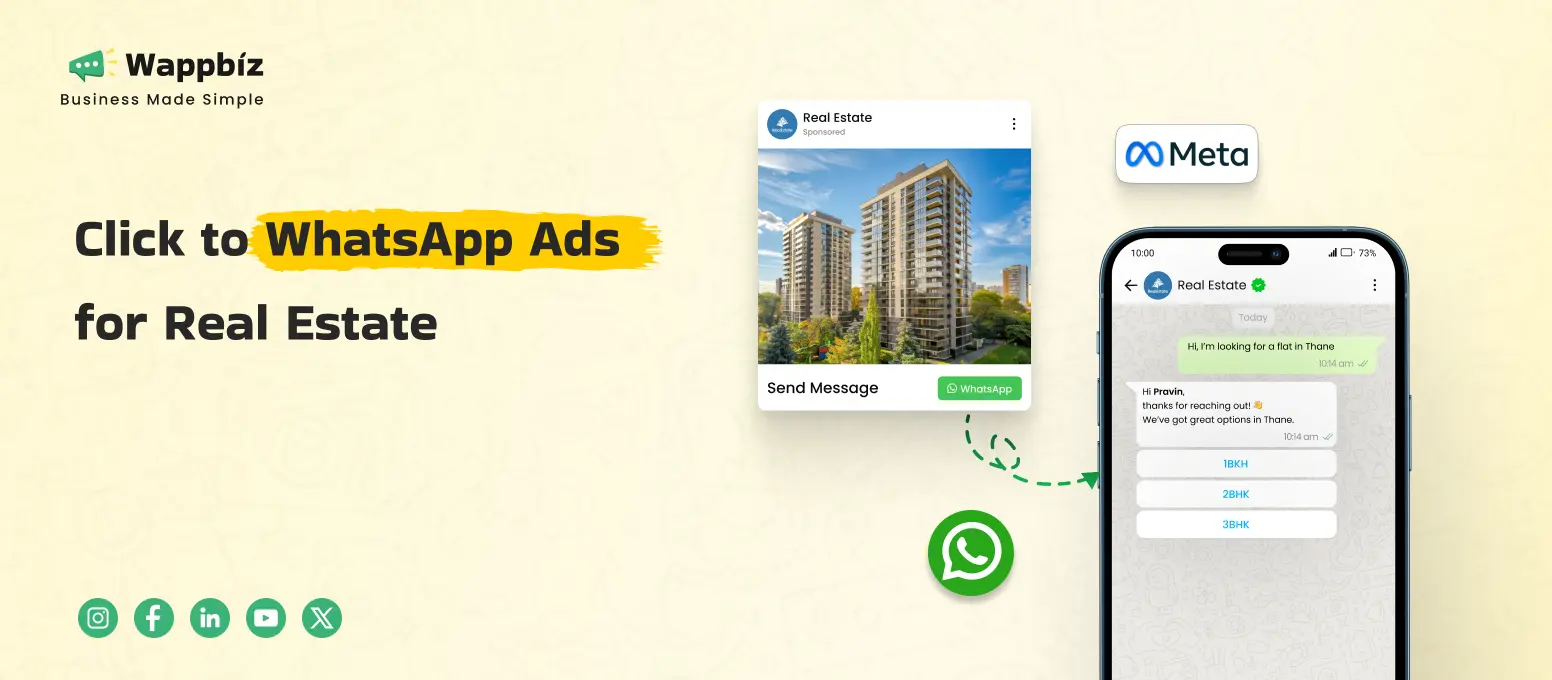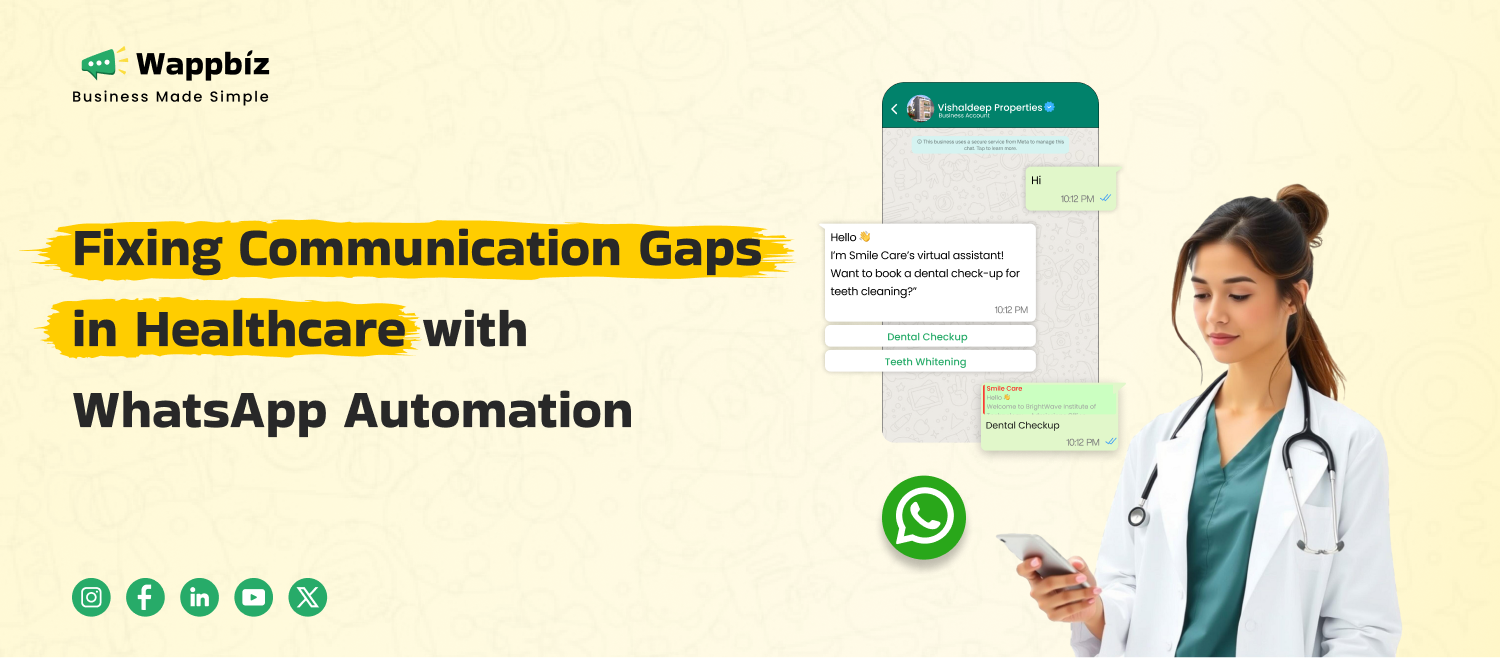Did you know that quick responses boost sales conversions by 60%? The WhatsApp Business API makes this possible, allowing sales teams to respond in real time and keep leads engaged. Companies can establish a seamless sales journey from sharing catalogs to scheduling demos, all within one chat, by integrating with tools like Wappbiz. Instant access to information is what today’s customers care about, enabling you to nurture relationships at every step. WhatsApp provides quick and efficient sales support through its campaign, particularly in corporations where modern business processes are on the rise with the WhatsApp analytics feature.
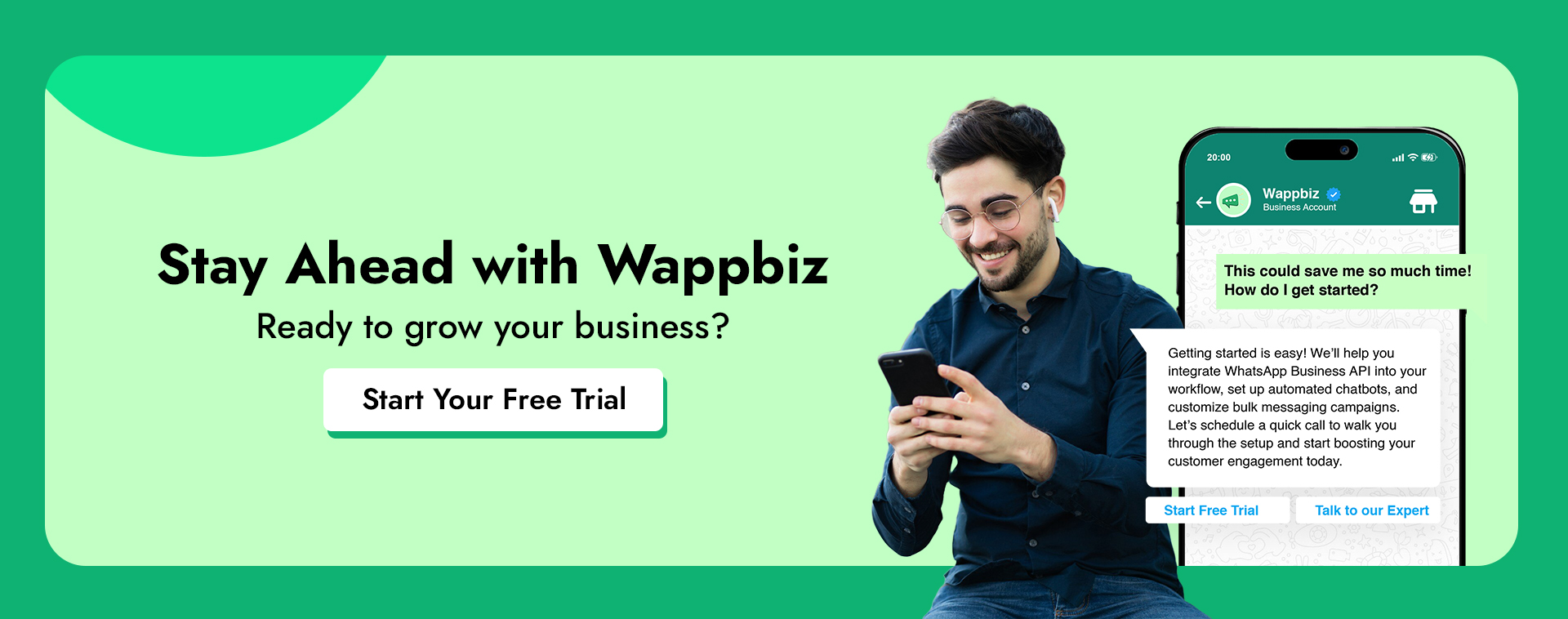
Why WhatsApp’s Business API is Important for Sales Support
With the WhatsApp Business API, sales teams can quickly communicate with prospects, address their queries, and engage them in the sales funnel. By using WhatsApp for sales teams, businesses can leverage campaigns, chatbots, and automation to respond to multiple inquiries at once, provide answers in seconds, and guide customers seamlessly through every stage of the buying journey. It’s time to move beyond traditional methods and fixed business hours — Wappbiz integration makes it possible to deliver automated replies, send targeted messages, and personalize conversations directly on WhatsApp. In today’s competitive market, this approach not only simplifies communication but also improves customer satisfaction, increases conversion rates, and drives stronger sales outcomes.
Key features of WhatsApp Business API for sales teams
Click-to-WhatsApp Ads Integration.
Display ads that open a chat on WhatsApp directly, which will enable the sales departments to have a conversation with high-intent leads immediately, rather than redirecting them to a landing page.
Multi-agent Access & Team Inbox.
Discussions can be held using the same WhatsApp number by multiple sales reps at the same time. Advanced routing will make sure that the correct lead is sent to the correct salesperson.
Message Templates
Sales teams can send consistent follow-ups, reminders, and re-engagement messages at scale using pre-approved and customizable templates without focusing on compliance.
Rich Media Sharing.
Share products, demo videos, prices, PDFs, invoices, or catalogs in the chat. This reduces the length of the sales cycle and gives the prospects all under one roof.
Interactive Message (Buttons and Lists).
Prospects can be led by sales teams with fast response (e.g., Book a demo / Request pricing) or given a menu of products to choose from, eliminating the need to go back and forth to maximize conversion.
Automation & Chatbots for Lead Qualification
Bots can capture lead details, ask qualifying questions, and route hot prospects directly to a human agent — ensuring sales reps spend time only on high-value conversations.
Conversation Analytics & Insights
Track KPIs like response time, conversation open rates, lead-to-sale conversions, and customer sentiment to optimize sales performance.
Verified Business Profile & Trust Signals
A verified blue tick plus a branded profile with logo, description, and contact details builds trust and credibility — crucial for closing deals faster.
Top 20 Use Cases of WhatsApp Business API for Sales Support
Instant Lead Follow-Ups
Sales teams can immediately follow up with leads when someone shows an interest via WhatsApp, ensuring timely engagement.
For example, it might be that when a prospect submitted the contact form on the website, they would instantly get a WhatsApp message from sales telling them thanks for their interest. This immediate follow-up serves to grab the lead’s attention while it is still fresh and significantly improves conversion chances. Quick responses through WhatsApp help leads not to turn cold, keeping the prospective customers in the loop with all necessary details quickly and avoiding them from slipping away, leading to competitors.
Product Catalog Sharing
WhatsApp simplifies the sharing of product catalogs, enabling customers to explore them all within the app.
For example, a sales agent can send a product catalog and its photos, description menu, and price to customers via WhatsApp. Customers can view the options at their convenience, eliminating the need for complex website navigation. Customers can easily explore products on WhatsApp, speeding up their decision-making process and enhancing sales prospects by simplifying it.
Automated sales notifications
WhatsApp automation allows businesses to send notifications about sales and special offers as targeted messages.
For example, if a customer had previously added an item to the cart or viewed it but not made a purchase, they could receive messages via WhatsApp when that item experiences a price drop or limited-time offer. Such personalized alerts draw back the potential buyers and thus instill urgency in their minds, persuading them to complete the purchase. With sales notifications informing your customers about ongoing promotions, you are able to get higher conversions while creating buzz for the limited-time offers.
Demo Appointment Scheduling
Product demos are simple to schedule on WhatsApp, often requiring just one message from customers confirming an appointment.
For example, a software company could provide prospects with a WhatsApp link, enabling them to schedule a demo slot at their convenience. WhatsApp schedules the appointment and automatically sends reminders to ensure the customer doesn’t miss it. The process remains simple, straightforward to follow, and keeps prospects informed at each step, resulting in attendance rates being higher compared to ever before. The less time in scheduling, the more businesses will attract more customers to demos and grow conversion ratios.
Order Status Updates
Using WhatsApp lets you provide real-time updates on order status to your customers, easing the worry among them and reducing inquiries.
For example, when a customer places an order, they receive notifications about the packing, shipping, and delivery status of their product. The smooth flow of communication keeps clients informed, enhancing both reliability and satisfaction. Regular order updates also cut down on the need for customers to contact support, streamlining the process for both parties. Through transparency at each step, businesses are improving the post-purchase experience, which increases customer loyalty and repeat purchases.
Customer Inquiry Resolution
It makes WhatsApp an excellent customer inquiry handler, as prospects can get timely answers to their questions.
For example, a customer is looking to know about the warranty of a product; they drop a WhatsApp message and get an instant reply from the sales team. Quick resolutions to inquiries help reassure customers so that they do not take too long to finalize a decision. The prompt availability of this support enhances the customer’s perception of the brand’s trustworthiness, increasing their likelihood to proceed with their purchase and thereby improving the overall customer experience.
Product Recommendations with a Target
Sales teams have the ability to send personalized product recommendations via WhatsApp, based on each customer’s unique interests and past purchases.
For example, if a customer has bought a coffee maker, they may get a WhatsApp message recommending accessories like coffee grinders or filters. These recommendations show that the business has been following or listening to the customer, thereby creating a personalized experience. Customization of suggestions makes purchases more probable, which means extra value to customers and improved engagement in general.
Payment Reminders
Companies rely on WhatsApp for payment reminders so that customers do not miss billing deadlines, thus ensuring a steady flow of revenue into the business.
For example, a subscription service could inform users about three or four days before their renewal date so they can take the required action. These reminders are especially useful for decreasing missed payments and building up favor. Gentle reminders are convenient for customers and safer for companies where clients pay on time. Sending reminders proactively ensures that firms enhance cash flow, reduce bill follow-ups, and give a seamless payment experience to customers.
Digital Brochure Sharing
WhatsApp makes it simple to distribute digital brochures, enabling prospects to access the information quickly.
For example, a real estate agent can send out a digital flyer of property listings, including images and descriptions as well as prices, directly to potential buyers. This style of website allows customers to quickly review options without needing to flip through 30 web pages. Directly sharing brochures also showcases the brand’s professionalism and commitment to offering a personalized experience in helping prospects with better decision-making. WhatsApp makes the whole system convenient for customers and speeds up the sales process by centralizing information.
Customer Feedback Collection
Sales teams can register a customer’s opinion after every interaction or purchase in order to improve services.
For example, after completing a transaction, a customer may receive a WhatsApp message asking for their feedback on the buying experience. This feedback not only shows that customers’ opinions matter but also helps you in making plans for improvements. Companies can pursue regular feedback from customers to fine-tune their strategy, solve recurring problems, and strengthen the relationships they have with them that enhance customer satisfaction and loyalty.
Order Confirmation Messages
The order confirmation messages sent through WhatsApp reassure customers about their successful purchase.
For example, if a customer orders something online, immediately after clicking the order button, they receive a confirmation message with all relevant information, including the order number and delivery date. This then provides reassurance, minimizing any anxiety and reaffirming the professionalism of the company. Timely acknowledgment of orders assures customers about the effectiveness of the business and provides a seamless purchase experience for the users, encouraging them to buy again from the enterprise and leaving them with positive impressions about your brand.
Loyalty Program Updates
Sales teams can notify loyal customers through WhatsApp about exclusive rewards, offers, and benefits of the program.
For example, sales teams can use WhatsApp to inform a frequent retail store customer about an upcoming loyalty member sale. Updating customers on their loyalty rewards solidifies their relationship with the brand and encourages repeat purchases. Exclusive access makes your loyal customers feel valued, improving retention ratios and bringing in occasional buyers to become lifelong brand advocates.
Limited-Time Offer Alerts
Companies can notify customers of flash sales and limited-time offers through WhatsApp.
For example, a fashion retailer might announce a limited-time, 24-hour special sale of hot items to its subscribers. These notifications entice customers with a sense of FOMO (fear of missing out), prompting faster decisions and hence boosting conversions. Using WhatsApp for promotions that drive purchases during short, time-sensitive windows also enables businesses to boost participation and sales in peak promotional periods with high levels of excitement and engagement among participating customers.
Product Announcements for the Season
Sales teams can send updates to customers about upcoming seasonal collections or product launches via WhatsApp.
For example, a clothing line may inform the customers about its spring collection launch to arouse their interest and make the first sales. These announcements happen at the right moment when businesses can offer seasonal goods to craving customers, ensuring new inventory moves out faster than entrances. Furthermore, educating customers about seasonal products not only enhances their shopping experience but also directs them toward your latest offerings.
Reminders for renewing subscriptions
WhatsApp is also a fantastic way to remind customers of upcoming subscription expiry dates or auto-renewals.
For example, a software company notifies its customers about their annual subscription renewal and offers them a discount to renew early. This ensures that the customers have enough time to plan and encourages them not to cancel their subscription. Meanwhile, renewal reminders reduce disturbance and provide a sense of continuity for customers, stabilizing revenue. Renewals are the best way that businesses can strengthen customer retention, as it shows long-term commitment to customers.
Upselling Opportunities
With WhatsApp, sales teams can recommend potential upgrades or premium versions of the product, which increases the order value.
For example, a customer looking for a basic laptop may get a message that talks about some high-end laptops equipped with extra features. This upselling technique allows customers to upgrade their purchase for a little extra value. By highlighting features of premium products, businesses increase the likelihood of higher-value transactions, providing customers with options that cater to their preferences and helping maximize sales revenue.
Cross-selling opportunities
Cross-selling via WhatsApp helps businesses suggest related products according to a customer’s recent purchases.
For example, if a customer has bought a camera, they could also receive recommendations for lenses or a camera bag. These cross-selling messages build convenience for customers by actively attempting to meet their needs and make shopping convenient. By making relevant recommendations, the business enhances every transaction and boosts customer satisfaction by understanding their needs and preferences.
Free trial offers
Companies can create free trial offers and promote them through WhatsApp to gain potential customers.
For example, a fitness app might send a WhatsApp message offering a 7-day free trial to prospective users, allowing them to experience the app’s features firsthand. By allowing customers to explore an offering without any commitment, free trials help in building trust, which makes conversions more likely. This enables brands to create a feeling of transparency by allowing customers the chance to make an informed decision before purchasing.
Training and onboarding new customers
Make onboarding easier and help the new customers understand a product or service via WhatsApp.
For example, a SaaS provider could potentially send multiple messages focused on enhancing the new user experience, such as setting up orientation features to maximize value. It minimizes frustration during setup and makes onboarding support part of the customer experience. Businesses provide preemptive assistance to enhance user onboarding, reduce early churn, and ensure customer assurance from the outset.
Personalized Thank You Messages
Sending personalized thank-you messages via WhatsApp is an effective strategy to maintain customer appreciation.
For example, an upscale retailer may follow up with a note thanking the shopper for her order and including care instructions for the item. This little touch makes customers feel valued and appreciated. A simple follow-up thank you illustrates a commitment to customer satisfaction and helps turn one-time buyers into repeat clients. These messages improve the customer experience and boost repeat purchases. Sending a note that is uniquely written not only makes the customer feel recognized, but it also serves as another stepping stone in building your relationship with the brand.
Conclusion
The WhatsApp Business API has enhanced sales support in the digitally revolutionized world by providing quick communication, one-to-one conversations, and automation to keep up with modern customer demands. WhatsApp gives businesses numerous opportunities to engage meaningfully and drive sales at each stage, from lead follow-ups in an instant to upselling. With WhatsApp integration via Wappbiz, your organizations can streamline their sales processes and drive outstanding customer satisfaction and fans well beyond transactions.
So, are you ready to boost your sales strategy? Wappbiz will enable your team to engage faster, work smarter, and convert leads into loyal customers, all on WhatsApp.

FAQ’s
How will the WhatsApp Business API facilitate sales support communication?
The WhatsApp Business API allows immediate communication for sales teams to respond, share updates, and follow up on inquiries.
Is the WhatsApp Business API helpful in boosting sales conversions?
Absolutely! Sales teams can take advantage of the WhatsApp API to nurture leads with personalized follow-ups, reminders, and on-time responses for improved conversion rates.
How can sales teams manage leads using the WhatsApp Business API?
WhatsApp allows sales teams to effectively manage leads by tracking interactions, setting reminders, and constantly interacting with clients along the funnel.
Does the WhatsApp Business API support order confirmations and updates?
Definitely! Through WhatsApp, sales can notify customers about order confirmation, shipping updates, and delivery alerts.
In what way does the WhatsApp Business API aid sales teams in collecting customer feedback?
Additionally, it enables sales teams to automatically send feedback requests following each interaction, providing actionable insights into client needs and suggestions for enhancing service.
Can I use the WhatsApp Business API for promotional offers?
Absolutely! Sales teams can use WhatsApp’s to deliver campaigns that tie in with special deals, promoting these offers directly through WhatsApp along with free, customized recommendations, resulting in an additional sale.
How do sales teams use the WhatsApp Business API to manage follow-ups efficiently?
Automated reminders and simple access to past interactions allow sales teams to nudge follow-ups when required, leaving no lead behind.

